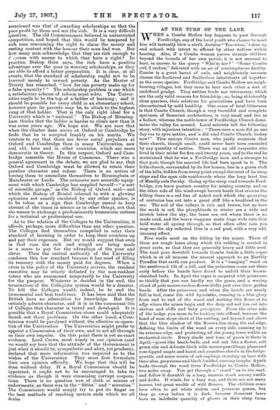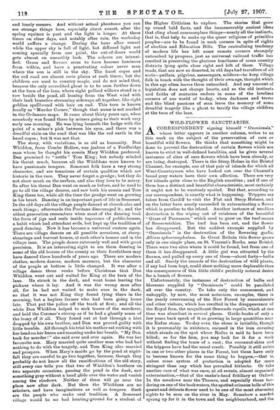AT THE TURN OF THE LANE.
WHEN a Combe Hollow boy happens to pass through. Fordbridge, any of the local youth who chance to meet him will instantly blow a shrill, derisive " Too-whoo," taken up and echoed with intent to affront by other natives within hearing. Also, if a Combo woman passes strange children beyond the bounds of her own parish, it is not unusual to hear, in answer to the query " Who'm her " "Some Combo owl, I reckon," delivered with an air of contemptuous finality. Combe is a great haunt of owls, and neighbourly sarcasm classes the feathered and featherless inhabitants all together as the same species. Fordbridge and Combe Hollow are neigh- bouring villages, but they seem to bear each other a sort of undefined grudge. They neither trade nor intermarry, which are the only valid reasons for friendship ; so, being at tolerably close quarters, their relations for generations past have been characterised by mild hostility. One cause of local bitterness is that Combo Church, though a very beautiful and complete specimen of Somerset architecture, is very small and lies in a hollow, whereas the noble tower of Fordbridge Church domi- nates the valley far around. Local satirists tell the following story, with injurious intention : "There were a man did go one day vur to zyve irttles, and 'a did vind Combe Church, looksy now!" This annoys Combe men, who justly maintain that their church, though small, could never have been concealed by any quantity of nettles. There was an old carpenter who lived in their midst for five-and-twenty years, and to the end he maintained that he was a Fordbridge man and a stranger to that part, though his married life had been spent in it. The little church, surrounded by its few houses, lies in a green cleft of the hills,lidden from every point except the crest of its steep slope and the open side southwards where the long level line of Mendip cuts the sky. Going up the steep road towards Ford- bridge, you leave pasture country for mining country, and on the other side of the wind-swept barren heath that crowns the hilltop there is a red line of naked rock which the quarrying of centuries has cut into a great cliff like a headland in the sea. The soil of the valleys is rich and brown, but up here the earth is red, the ploughlands in winter are a wide red stretch below the sky, the lanes are red where there is no made road, and the heavy waggons make huge wide ruts that hold water all spring through, so that often after rain you may see the sky reflected blue in a red pool, with a very odd, uncanny effect.
Five roads meet on the hilltop by the mines. Three of them are rough lanes along which the redding is carried in great carts, so that they are generally heavy and little used. The road goes downhill towards Combs beside a little copse which is at all seasons the nearest approach to an Earthly Paradise that earth can produce. It is a "hanging" wood on the southward tilt of a bill, and the primroses come out there early before the hazels have dared to unfold their brown- sheathed buds. In April the-copse is carpeted with primroses so thickly that you can hardly see the grass, and a waving cloud of pale mauve cuckoo-flower drifts just over their golden heads. After the primroses, and when the hazels are nearly full in leaf, come the wild hyacinths, running in a blue glory from end to end of the wood, and melting like flame at its eerge where the mines begin and the deep red soil lies cut into shelves and cliffs and baby precipices. From the other side of the hedge you seem to be looking into elfland, because the band of man stops short at the cutting, and beyond and above that the blue shadow of the flowers lies along the red edge, defining the limits of the wood on every side, running up to its extreme edge, and protecting all the young trees within an enchanted circle. Every shade and tone of green is there in April,—jewel-like beech-buds, and red oak like a flower, soft green elm and delicate birch with mauve pencillings, plane and rose-tipped maple and hazel and countless shrubs in the hedge- growth, and some scores of ash-saplings standing up bare with their slim, grey stems and black-budded, curving boughs. A path leads through the wood from Fordbridge to Combs Hollow, two milesaway. You get through a " shard " on to the road, and follow it downhill in a long, sinuous track among knolls and drifts. It winds for a long way, and there are not many houses, but great wealth of wild flowers. The children come here often to get white violets and primrose posies, but they go away before it is dark, because Somerset lanes have an indefinite quantity of ghosts in their steep turns and lonely corners. And without actual phantoms you can see strange things here, especially about sunset, after the spring equinox is past and the light is longer. At these times on clear days, and notably after rain, the workaday world suffers a change. During the hour atter sunset while the upper sky is full of light, but diffused light not coming specially from one point, the out-of-doors world gets almost an unearthly look. The colours are intensi- fied. Grass and flowers seem to have become luminous from within, and have a penetrating colour never seen where the sun is still in the sky. The hazel copse and the ied road are almost eerie places at such times; but the children are used to country magic, and do not mind that because the only accredited ghost is to be seen further down at the turn of the lane, where eight pollard willows stand in a row beside the pond, all leaning from the West wind with their limit branches streaming sideways all together, like eight goblins spellbound with hair on end. This turn is known locally as "Murder earner," though that name is not marked In the Ordnance maps. It came about thirty years ago, when somebody was found there by miners going to their work very early one morning. He was lying beneath the hedge with the point of a miner's pick between his eyes, and there was a dreadful stain on the road that was like the red earth in the hazel copse ; but it was not that.
The story, with variations, is as old as humanity. Dan Whiddon, from Combe Hollow, was jealous of a Fordbridge man whom he thought his cousin Mary Whiddon preferred. Dan promised to " zettle " Tom King ; but nobody minded his threat much, because all the Whiddons were known to have passionate tempers. Somerset folk have a very strong character, and are tenacious of certain qualities which are historic in the race. They never forget a grudge; but they do not show much on the surface, and also they love to be merry. So after his threat Dan went on much as before, and he used to go to all the village dances, and saw both his cousin and Tom King there too, while all the time the grudge went on growing in his heart. Dancing is an important part of life in Somerset. In the old days all the village people danced at church-ales and such things ; afterwards the Puritans discouraged it; and the oldest generation remembers when most of the dancing took the form of jigs and reels inside taprooms of public-houses, a habit which had attendant evils, but kept up the tradition of good dancing. I•Tow it has become a universal custom again. There are village dances on all possible occasions, at sheep- shearings and harvest homes, at each other's houses and in the village inns. The people dance extremely well and with great precision. It is an interesting sight to see them dancing in some of the old houses of the county as their forefathers may have danced there hundreds of years ago. There are modern clothes, modern dances, modern manners, but the character of the people at bottom is little changed.. It was after a village dance three weeks before Christmas that Dan Whiddon went out and waited for King at the turn of the lane. He struck in the dark, and went home leaving the pickaxe where it lay. And it was the wrong man after all, for he had not waited to make sure in the dark, so that it was not ling they found lying there in the morning, but a hapless farmer who had been going home late. That put the police off the track at first; and all the while Dan Whiddon helped to seek traces of the murderer, . and held the Coroner's stirrup as if be had a ghastly sense of the irony of it all. They found out at last through a hint , dropped by his own brother, and Dan was proved guilty with . little trouble. All through his trial his mother sat rocking with . her head on her knees and moaning under her breath. "My Dan, took for murder !" she said over and over again. He was her favourite son. Mary married quite another man who had had nothing to do with the tragedy, and Tom King also married and prospers. When Mary's maids go by the pond at night- . fall they are careful to go two together, because, though they . probably do not know all the ramifications of the old story, still every one tells you that two of Whiddon's brothers on two separate occasions, passing the pond in the dusk, saw something grey without a head glide over the water and vanish . among the shadows. Neither of them will go near the place now after dark. But then the Whiddons are no scholars, and have imaginations as well as tempers. Such . are the people who make oral tradition. A Somerset village would be no bad hunting-ground for a student of the Higher Criticism to explore. The stories that grow up round bald facts, and the immeasurably ancient ideas that cling about commonplace things—nearly all the instincts, that is, that help to make up the queer religions of primitive peoples—are to be found in such corners in spite of rights of election and Education Bills. The ceutralising tendency of modern life has left some remote corners strangely untouched by progress, just as universal railroad traffic has resulted in preserving the glorious loneliness of some countky districts lying quite close right and left of them. Village roads, that are now so deserted, in old days had travellers of all sorts—pedlars, pilgrims, messengers, soldiers—to keep village folk in touch with the thought of their own age, thought which in this age often leaves them untouched. And any amount of legislation does not change hearts, and so the old instincts and faiths of centuries endure in some of the loveliest corners of our world of to-day, when darkness and terror and the blind passions of man leave the memory of some dreadful tragedy like a ghost to terrify the village children at the turn of the lane.







































 Previous page
Previous page